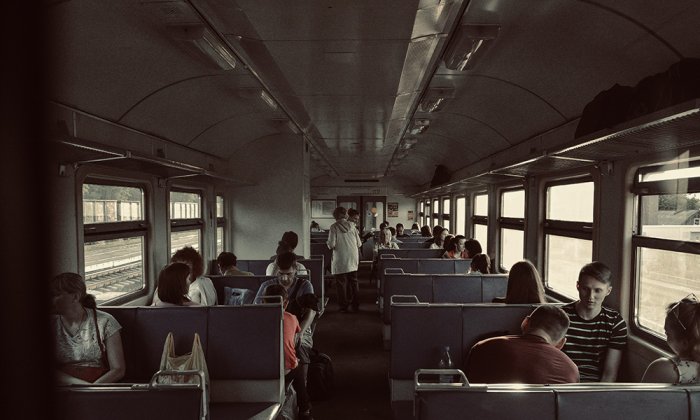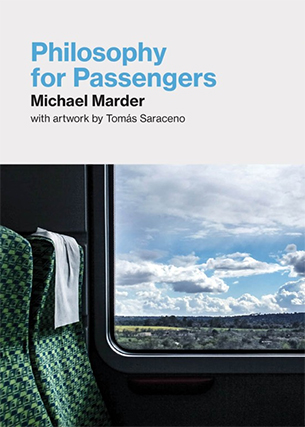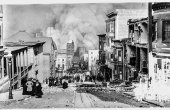Philosophy for Passengers: Reflections on ‘Passenger Time’

“Passenger time” is not a reference to the duration of a trip, as measured by the clock: 20 minutes, two hours, eight and a half hours . . . Nor is it the time of departure or the hour of arrival at a destination. What I am interested in is the passengers’ sense of time, which may help disclose the sense of time as such.

While the clock synchronizes our activities and permits us, for instance, to board that 7:55 a.m. flight or 2:30 p.m. bus, each of us confronts the flux of time in a unique, idiosyncratic way. The experience of time depends largely on the mood you are in: bored, you feel time dragging on, a thick, viscous substance, in which you are bogged down; excited, you have an impression that time flies, almost too fast for you to obey the carpe diem injunction. As a branch of philosophy, phenomenology studies, among other things, multiple subjective perspectives on time, or, technically speaking, time-consciousness.
Whatever the speed at which it seems to flow, time passes. We pass with it and in it. There is a tinge of fatalism about that passage in Virgil’s “Georgics”: “fugit inreparabile tempus,” “irretrievably, time escapes.” So, time is to be sought in passing, in a passage, a stretch or a stretching that determines its activity as time. We are, all of us, time’s passengers, witnesses to its passing, which is also our own. Time travel in science fiction follows on the heels of time’s passage. As passengers on any means of transport, we are, therefore, reflecting time’s activity. That is why passengerhood gives us a privileged perspective on this philosophical and existential leitmotif.
The time of our lives passes between two black boxes, two Xs, two vanishing poles: unrepresentable, unreachable.
For millennia, human mobility has structured our thinking of time. Changes of place have been the signs and measures of time, ever since the Mesopotamian “Epic of Gilgamesh” and Homer’s “Odyssey.” Even if its shape was circular — the narrative arc bent, the end meeting the beginning — an epic journey defined time-imagination all the way to the 19th century, with Hegel’s “Phenomenology of Spirit” for its pinnacle. The time of an epic relied on coherent plot development, where the final denouement both overshadowed and retrospectively shed light on the rest of the story. Gilgamesh’s failure to attain immortality, Odysseus’s return home to Ithaca, and Spirit’s reunification with itself in absolute knowing bestowed the ultimate sense on all previous events in their respective stories and made other changes of place and time insubstantial by comparison.
As grand master narratives and traditionally authoritative sources of meaning came under attack in late modernity, and as travels started weaving the social fabric instead of puncturing it, the thinking of time underwent a number of momentous modifications. Transition, transit, and transformation prevailed over the original, more or less static, state and the end result alike. The departure and the destination paled in significance compared to the middle. In keeping with Taoist philosophy and with the old German proverb “Der Weg ist das Ziel,” the path became the goal.
Twentieth-century physics faithfully reflects this shift. Quantum mechanics elucidates the interference of the observer with the observed, the act of observation meddling with the reality it registers. In Einstein’s general theory of relativity, gravity bends time (or, more accurately, the spacetime field around an object); in his special theory of relativity, time slows down or accelerates depending on how fast you travel in relation to something else. An emphasis on observation at the quantum level and on relation in relativity is the emphasis on that which is in-between two or more elements, in contrast to free-standing, independent, autonomous objects and subjects. By the same logic, the temporal crux of passengerhood is the perceived and measurable duration in a passage between places (and between times — especially, of departure and arrival) that is not subject to the purpose-driven, goal-oriented concerns of a journey, a trip, or traveling. It is as if, in the time of passengers, time came into its own precisely by refusing to come into its own, by refusing to be reconciled with a higher end that would extinguish its unrest.
To get into this temporal mindset, try examining your life from the perspective of transit and transition periods, instead of departures, arrivals, and phases of staying put. View the places you leave and those that welcome you from the middle of the passages stretching between them, not the other way around. The main events of our lives are also framed in the middle, between further events, their past and future horizons extending all the way to the objective framing of human life between birth and death. Intriguingly, these cardinal points of our existence are inaccessible to our consciousness as a pure beginning and end. The time of our lives passes between two black boxes, two Xs, two vanishing poles: unrepresentable, unreachable. Life is a middle passage without the shores to sail from or to moor at. In a paraphrase of the 17th-century French mathematician, theologian, and father of the first modern form of public transport Blaise Pascal, who, in his turn, paraphrased 15th-century thinker Nicholas of Cusa, life is an infinitely finite sphere, of which the middle is everywhere and the circumference nowhere.
In the paradigm of the time that passes — the time that is marked principally by its activity of passing, the activity indistinguishable from the passivity of pathos — the past is the predominant tense. For passengers on a train, a bus, a plane, or any other means of transport, every place they leave behind immediately transitions from spatial into temporal terms: they move past it, and the instant of having cut through it drifts into the past. The future is cobbled together from portions of air, sea, or land routes not yet left behind but potentially convertible into the past, that is, prepared for passenger experience. Armed with a whole arsenal of recording technologies, we make memories for ourselves. The present stands no chance. Born old, it is on the verge of passing and, by the time it is presented (or re-presented) before our perception and cognition, it is no longer present.
Passengers, who pass with and as the time that passes, may be divided into two groups unrelated to the conventional classes. The first strive to pass the time (of a trip or of a life); the second endeavor to make time for sundry pursuits. I am taking note of this division without implying any positive or negative value judgment on either group, between which we all alternate depending on the circumstances. Those who wish just to pass the time may not be particularly productive or alert, as they take a nap onboard or resort to anything that would blunt their senses and stifle . . . what? The evidence of time as such, with which we are ceaselessly bombarded in our role as passengers. Passing the time within time’s passage is letting oneself be carried along — not only by the means of transport one utilizes, but also by duration, by the seemingly unending stretch of a passage from A to B. Zeno’s paradoxes nicely illustrate this glimmer of realization that we try to put out of our minds the moment it hits us, passengers, with all its disconcerting might.
According to the so-called dichotomy paradox, “however near is the mobile to any given point, it will always have to cover the half, and then the half of that, and so on without limit before it gets there” (Aristotle, “Physics,” VI). Suppose your bus is within 100 meters of a stop. It will first have to cover half that distance (i.e., 50 meters), and half of that half (i.e., 25 meters), and so on, before it reaches the stop, if ever. Infinity lurks within a finite period; each voyage takes an eternity. Duration is perdurance. If passing time as a passenger is tantamount to passing an eternity, a life sentence encrypted in every bus ride, then why not pass this time in total oblivion of its passage?
In another of Zeno’s paradoxes, the super-fast runner Achilles can never overtake a tortoise. Why? Because “the slowest will never be overtaken in its course by the swiftest, inasmuch as, reckoning from any given instant, the pursuer, before he can catch the pursued, must reach the point from which the pursued started at that instant, and so the slower will always be some distance in advance of the swifter.” Assuming that you travel in a horse-drawn carriage that departs from a station five minutes ahead of a high-speed train, the train will never catch up with the horse, because by the time it reaches a mark the horse will have already passed, the animal will have advanced a little more in relation to the mechanical means of transport, and again ad infinitum. For Zeno, a horse moves faster than a train from the vantage point of human thought that breaks the line of movement down into an infinity of points. Just passing the time of a journey is surrendering to the inevitable lag of our latest technologies vis-à-vis the speed and the demands of thought.
Passengers who want to do no more than pass a trip with the least awareness are reacting to the too-much of time weighing on them. Those who, in a caffeine-drenched state, struggle to make time for work or “active rest” are responding to the chronic not-enough of time. These two kinds of passengers belong together in a strange combination that slips infinity into finitude. In a dance of figure and ground, passing the time that apparently refuses to come to an end is foregrounding the infinite, whereas making time that ostensibly runs out before we have it at our disposal is concentrating on the finite. On the one hand, we pass the slowly elapsing, nearly still time; on the other, we experience time itself as ineluctably passing, the moment entirely swallowed up by the past before it has had a chance to make itself known. This is the temporal scheme of passengerhood, today’s unmoved mover.
Michael Marder is Ikerbasque Research Professor in the Department of Philosophy at the University of the Basque Country (UPV-EHU). He is the author of, among other books, “The Philosopher’s Plant: An Intellectual Herbarium,” (Columbia University Press) “Dump Philosophy: A Phenomenology of Devastation,” (Bloomsbury), and “Philosophy for Passengers,” from which this article is excerpted.




